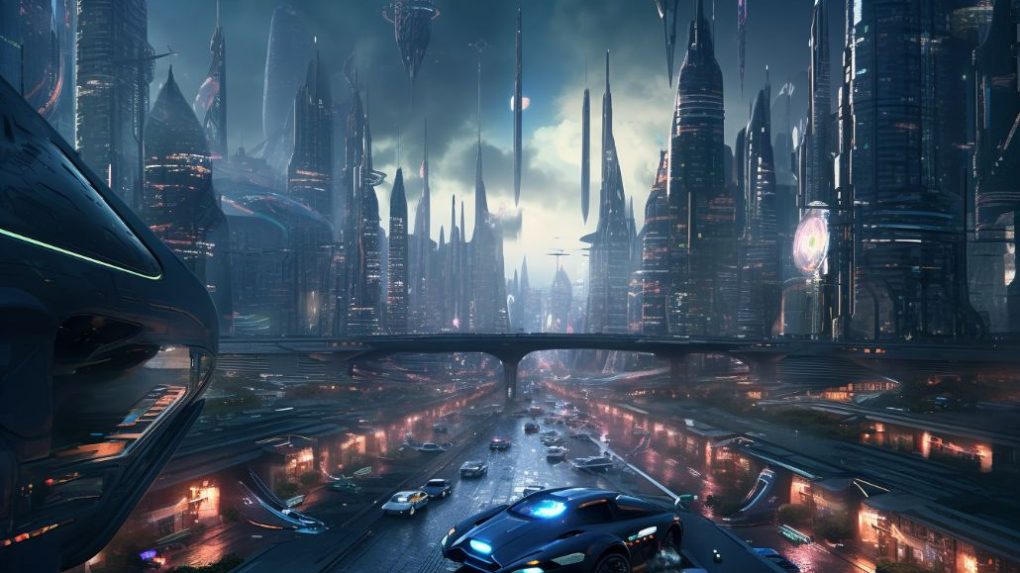The question “Is the future predetermined?” has intrigued philosophers, scientists, and thinkers throughout history. Does the universe have a determined course, or do we have free will to shape our destinies?
This article explores this complex topic, delving into quantum mechanics, relativity, and philosophical discourse.
The Concept of a Predetermined Future
The notion of a predetermined future is intricately tied to the philosophical and scientific idea of determinism. Determinism holds that every event or state of affairs, including every human decision and action, is the inevitable and necessary consequence of preceding states of affairs. This view proposes that the entire future could be predicted with absolute certainty with sufficient information about the present.
Underlying this belief is the principle of cause and effect, sometimes called “causal determinism.” This principle is deeply rooted in our understanding of the physical world. For instance, physics assumes that every event has a cause and can be predicted with perfect accuracy if its cause is known.
When we apply this to the idea of a predetermined future, it suggests that the future state of the universe is entirely determined by its current state and the laws of physics. From the micro level, such as the spin of an electron, to the macro level, like the trajectory of celestial bodies, every event is determined by the conditions that preceded it.
Also read Facts About Aliens – Shedding Some Light On Common Misconceptions About Extraterrestrials
Laplace’s Demon is a philosophical concept that illustrates this viewpoint. Pierre-Simon Laplace proposed it in the 19th century. He suggested that if there was an intellect (which he called a “demon”) that, at a particular moment, knew all the forces governing nature and the positions of all things in the universe, then this intellect could predict the future and retrodict the past with perfect accuracy, as far as these concepts are meaningful.
However, it’s important to note that while determinism has significantly influenced science and philosophy, it’s also faced considerable challenges. For example, in quantum mechanics, Heisenberg’s uncertainty principle states that there are limits to how precisely specific physical properties (like position and momentum) can be simultaneously known. This introduces an element of randomness and uncertainty that appears to be at odds with a strictly deterministic view of the universe.
Ultimately, the concept of a predetermined future is complex and multifaceted, straddling the line between philosophy, science, and our fundamental understanding of reality. The idea provokes thought and discussion, urging us to grapple with the nature of time, causality, and the fabric of the universe itself.
Free Will vs. Determinism
Free will and determinism have long been at odds. The belief in free will asserts that humans can act independently of deterministic physical laws, implying that the future is open and not predetermined. Conversely, determinism argues that the universe operates according to set laws, meaning the past and present fundamentally determine the future. Reconciling these two concepts presents a significant philosophical and scientific challenge.
Related: Future Predictions and Premonitions
Quantum Mechanics and Its Role
Quantum mechanics introduces an entirely different perspective to the question, “Is the future predetermined?” Unlike classical physics, which is deterministic, quantum physics teaches a degree of randomness and probability. At the quantum level, events are not strictly determined. For example, the exact moment a radioactive atom will decay or an electron’s spin state cannot be precisely predicted.
Is the Future Predetermined? A Quantum Perspective
Quantum theory introduces the concept of superposition, where particles can exist in multiple states simultaneously until observed, at which point the particle changes to a single state. This brings a sense of unpredictability and randomness, leading some to argue that the future is not predetermined but probabilistic at the quantum level. However, the question remains: does this quantum randomness influence our macro-scale reality and, in turn, our future?
Einstein’s Theory of Relativity and Its Implication
Albert Einstein’s theory of relativity combines space and time into a single, unified entity known as spacetime. This theory proposed that the fabric of spacetime is curved by matter and energy, leading to the phenomena we know as gravity. In the context of our discussion, some interpret relativity as implying a “block universe” where the past, present, and future all coexist, suggesting a predetermined future.
Don't miss The Truth Behind the UFO Lights: Debunking Myths and Unraveling Mysteries
The Influence of Relativity on Our Understanding of Future
Relativity introduces fascinating perspectives to our question. If spacetime is a unified entity where past, present, and future exist together, it implies that the future exists already, predetermined in the fabric of spacetime. However, this perspective raises complex philosophical questions about the nature of time, free will, and causality.
Scientific Perspectives on a Predetermined Future
The deterministic view of the universe, where the future is entirely determined by the present, aligns more closely with classical physics than quantum mechanics. While quantum physics introduces uncertainty and randomness, its implications for macro-scale events and our everyday lives remain unclear. Therefore, the question remains open from a scientific perspective and is a subject of ongoing research and debate.
The Paradox of Free Will in a Predetermined Universe
If the future is predetermined, where does that leave free will? Is our sense of making choices merely an illusion? Some argue that free will can coexist with determinism, a stance known as compatibilism. It suggests that even though our universe might be deterministic physically, we still make choices based on our desires and motivations, thus exercising free will.
Related Article What Is Remote Viewing? – Exploring A Controversial Phenomenon
The Future of Research: New Horizons in Quantum Mechanics and Relativity
Research in both quantum mechanics and relativity continues to shed light on the mysteries of our universe and, potentially, the nature of the future. Quantum theory is still evolving, with researchers endeavoring to reconcile it with gravity, a feat that has eluded even the brightest minds, like Einstein. Furthermore, studying quantum effects at larger scales might illuminate how quantum randomness interacts with our everyday reality.
Is the Future Predetermined? Summing up the Debate
The debate on whether the future is predetermined is far from settled. It’s a complex question that straddles science and philosophy, with different interpretations depending on whether one looks at the world through the lens of quantum mechanics, relativity, or classical physics. It’s also deeply intertwined with our understanding of free will and ‘time.’
You may also like How Did I Die in My Past Life? Understanding the Lessons and Truths
Conclusion
The question, “Is the future predetermined?” fascinates and perplexes us. While some argue that the deterministic laws of physics suggest a predetermined future, others point to quantum mechanics and the element of randomness to advocate for an open end. Regardless of where the truth lies, one thing is sure. As our understanding of the universe expands through the continued investigation of quantum mechanics and relativity, we will inevitably come closer to an answer. Until then, the question remains a compelling topic of debate and speculation, highlighting the beautifully complex nature of our universe.
Frequently Asked Questions
Do Past and Future Exist?
The past and future existence depends on our understanding of time. In physics, particularly in the context of Einstein’s theory of relativity, all points in time – past, present, and future – are said to exist simultaneously in a four-dimensional structure known as spacetime. However, this doesn’t fit our everyday experience of time, where we perceive a clear distinction between past, present, and future. Thus, the existence of the past and future can be both a yes and a no, depending on the perspective one takes.
Is Past and Future an Illusion?
The perception of time and the past and future may be considered an illusion from certain philosophical and scientific viewpoints. According to the “block universe,” or “eternalist” theory often associated with Einstein’s relativity, time is a dimension much like space, and all moments exist simultaneously. Our perception of the flow of time, from past to future, might be just a feature of human consciousness. However, this remains a controversial topic with no definitive resolution.
Can the Future Change the Past?
In our everyday understanding of time, the past is fixed, and the future cannot change it. However, in the strange world of quantum physics, some interpretations allow for a certain kind of “retrocausality,” where future events can influence the past. Specifically, the concept of quantum entanglement and experiments such as the “delayed-choice” experiment suggests such phenomena. However, it’s important to note that these interpretations are contentious and not universally accepted.
Is Our Destiny Predetermined?
The question of whether our destiny is predetermined is a profoundly philosophical one and has been the subject of debate for centuries. Determinism, the doctrine that all events, including human actions, are ultimately determined by causes external to the will, suggests that our destinies are indeed predetermined. However, contrasting concepts like free will propose that our actions and decisions shape our futures. Scientifically, the debate touches on complex topics in physics and neuroscience, and there’s no consensus answer.
Are All Our Choices Predetermined?
Like the question of destiny, whether our choices are predetermined is complex. From a deterministic perspective, our choices could be seen as the inevitable outcomes of the laws of physics acting upon the matter in our brains. However, from a subjective experience, it feels as though we have the freedom to make choices independently. Some theories, like compatibilism, attempt to reconcile these views by suggesting that our choices, though influenced by prior events, can still be considered ‘free’ in the sense that they align with our desires and motivations.
Is it Possible That the Universe Came from Nothing?
The notion that the universe came from nothing is a profound question that challenges our understanding of physics and cosmology. Specific interpretations of quantum mechanics suggest that ‘space’ is not truly empty but filled with quantum fluctuations, potentially allowing for the creation of a universe. Moreover, theories such as cosmic inflation and the Big Bang model point towards a universe that could have emerged from a highly dense and hot state, although what preceded this state remains unknown. However, these theories and interpretations are still subjects of ongoing research and debate.



